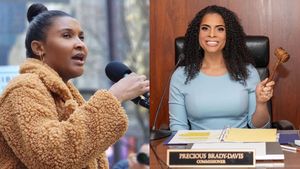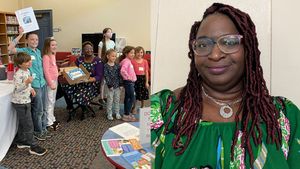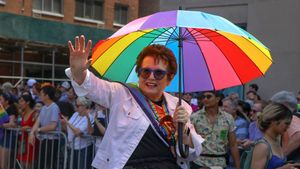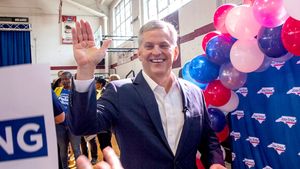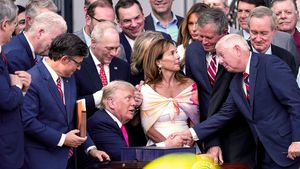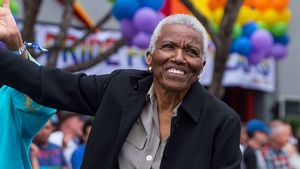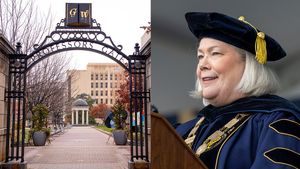Amid the ongoing aftermath of a global pandemic, a heightened political climate, and the personal challenges of launching a production company, all I can do at times to cope is throw on my girl Beyoncé's Cowboy Carter. The opening of 'AMERIICAN REQUIEM' is going to hit every time.
Looking back, I realize that Beyoncé and her music have been a cornerstone of my come-up.
From first witnessing her as part of Destiny's Child as a kid to defiantly belting out my rendition of "Listen" from Dreamgirls in my teens to bellowing "Tell 'em boy bye!" in my early twenties, Beyoncé and her artistry have undoubtedly been the soundtrack to my storied life.
She's always been there, and she's always been that girl.
I remember coming out in 2011, the same year she released 4. Two years later, after the Supreme Court ruled against Prop 8, Beyoncé posted an Instagram picture of a red sticky note with her iconic handwriting that read, "If you like it, you should be able to put a ring on it," referencing her hit "Single Ladies." I felt validated as a baby gay seeing my favorite artist publicly support the court's decision. It filled me with pride to know my girl was standing up for equal rights, standing up for my rights.
It honestly made me stan harder.
Another crucial moment when B was there was during and after the 2020 pandemic. Working in performing arts and media, worlds built on live events and packed crowds, the impact of social distancing and isolation hit hard. I was working an administrative job for one of the biggest theaters in the world and later furloughed for eight months. This was a time of angst and uncertainty for me, particularly after the murder of George Floyd and the racial reckoning that followed.
At that point, the world watched and had to take a raw look at itself.
The world of theater and Broadway was no different. While the Black Lives Matter movement rose with riots and protests in the streets, Black folks and other marginalized groups within theater institutions banded together to draft the We See You White American Theatre letter. It was filled with demands meant to hold institutions accountable for upholding white supremacy and hierarchy. It made noise, but this, of course, didn't stop me and other marginalized folks from being the first furloughed or let go from our positions. We got through, but only with some damage to our armor.
A year later, as the world slowly started to get back on its feet, I was asked back to my job and it felt like we were all slowly coming back "ou'syde!" But I felt different. A part of me knew I couldn't go back to things as they were. It no longer felt like "business as usual." Little did I know, the artist always with me had similar sentiments and was ready to make us all feel liberated.
"BREAK MY SOUL" will always be famous in this house. It became my anthem. Act I: Renaissance, an album dedicated to Black queer people who have long been among the most marginalized, served as a powerful tribute to the community. The album filled me up, ignited my spirit, and lifted me after a period of hardship. It proved that even amid a pandemic, Queen B would see us - would see me - and she was "gonna tell everybody!"
Her recent journey of reclaiming spaces that rightly belong to her and her community resonates deeply with my own experiences as a Black queer person in the entertainment industry. From being an actor and going into audition rooms, not seeing anyone on the other side of the table who looks like me, or not being "fit enough" or "masculine enough" for roles that were also never meant for me, the struggle for acceptance, inclusion, and feeling "welcome" is all too familiar.
Bey has undoubtedly been there.
Before the release of Cowboy Carter, Beyoncé mentioned that the album was inspired by an experience where she didn't feel welcomed. Many speculated this was about her 2016 performance with The Chicks at the CMAs, where someone reportedly snarled, "Get that Black b**** offstage!"
Throughout her career, Beyoncé has faced numerous instances of sexism, misogyny, blatant racism, and anti-Blackness. Nevertheless, she has consistently pushed against these archaic systems, channeling her beliefs and experiences into her art, from empowering anthems like "Independent Women" and "Survivor" all the way to "Run the World (Girls)" and "Freedom."
Despite all her acclaim and success, Beyoncé's most significant source of pride—being a Black woman—has also been her greatest predicament. From the incident at the CMAs to never winning the Grammy's coveted Album of the Year (although she is the most-awarded Grammy winner), these situations underscore that, despite her accolades and triumphs, Beyoncé continues to confront the persistent traditions of sexism and racism like so many of us.
But one must ask the question: if Beyoncé—Beyoncé?! (insert Tiffany Pollard gif)—can't shatter the glass ceilings of sexism, misogyny, and racism (and by proxy homophobia, fatphobia, and transphobia), how the hell can any of us?
When Beyonce started Parkwood Entertainment in 2008, she shared that part of the reason for founding the label was that she didn't see many Black people or women at other major record labels. Starting Parkwood allowed her more creative control and independence over her business ventures and career. As the HBIC, she aspired to hire underdogs, talented women, and people from various backgrounds who were more than capable but needed a chance.
Since doing so, Beyoncé has produced some of her most daring and culturally impactful work.
As I embark on my venture with my production company, I'm dedicated to amplifying the voices and narratives, particularly of Black and queer folx. After ten years in the business, from working at the Apollo to right on Broadway, I realized the arts weren't innately made with people like me in mind and that it's time for me to tell and share the stories I want to share in my way—exactly like my girl, Bey.
While Bey and her artistry have been the soundtrack to my life, I recognize I am not the only one she's inspired. Many people, especially Black queer folks, find solace and inspiration in her music and art. As a Black queer person who has always felt the sting of being a double (or triple) minority, that feeling of belonging I get from her work is like a balm. Our sharing in this beautiful 30-year soundtrack she's composed has also built community and chosen family (hey, Hive!)
The reason we can relate to Bey is because she is a Black woman existing in this unfair world, too. A world where, if we're being frank, there shouldn't even be a glass ceiling to shatter for me, you, or Beyonce.
When so many parts of the world try to erase our existence, Bey sees us.
From unapologetically embodying her Black womanhood to her deep love and support for the LGBTQ+ community, Beyoncé has been more than just a pop culture icon for many. She symbolizes resilience and liberation and is a beacon of hope for those at the intersections of marginalization and Black magic.
So, on the Queen's birthday, I thank Bey for being the backdrop to this musical I call Life.
As I keep trailing this path despite what the world thinks, I know she'll continue to bring the beat in and keep my enemies surprised. And I'll continue to 'stay gracious,' because as Bey says, the best revenge? Our peace and our paper.
Rayshaun Sandlin (he/him) is an artist, writer, and champion of the culture. He has contributed to Tony-nominated Broadway productions and worked with some of the most prestigious theater institutions in the world. A graduate of the S.I. Newhouse School of Public Communications at Syracuse University, Rayshaun is the founder of RAYNGE Production Company, which is dedicated to promoting and producing Black queer stories. He was recently selected for the 2024 Vox Media Writers Workshop. For more: rayshaunsandlin.com | @rayshaunsandlin
Voices is dedicated to featuring a wide range of inspiring personal stories and impactful opinions from the LGBTQ+ community and its allies. Visit out.com/submit to learn more about submission guidelines. We welcome your thoughts and feedback on any of our stories. Email us at voices@equalpride.com. Views expressed in Voices stories are those of the guest writers, columnists and editors, and do not directly represent the views of Out or our parent company, equalpride.



























